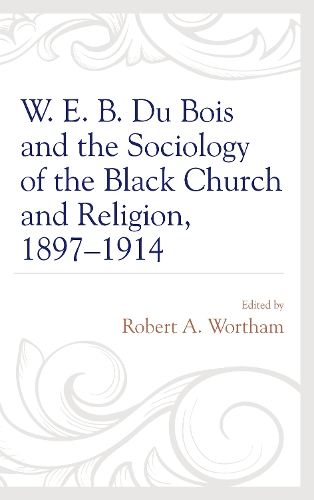
W. E. B. Du Bois and the Sociology of the Black Church and Religion, 18971914
(Paperback)
Available Formats
Publishing Details
W. E. B. Du Bois and the Sociology of the Black Church and Religion, 18971914
By (Author) Robert A. Wortham
Bloomsbury Publishing PLC
Lexington Books
11th September 2019
United States
Classifications
Professional and Scholarly
Non Fiction
Religion and beliefs
306.6
Physical Properties
Paperback
286
Width 152mm, Height 228mm, Spine 21mm
440g
Description
W. E. B. Du Bois is the founding figure of the sociological study of the Black Church. His discussion of the six functions of Philadelphias Black Church in The Philadelphia Negro (1899) represented an early example of a functional analysis of a religious group. In The Negro Church (1903), he integrated the findings from religious census data, denominational statistics, small area surveys, ethnographic fieldwork, and historical studies to paint a picture of the vibrant role the Black Church played in the African American community. Du Bois discusses the Black Church in three of the essays included in The Souls of Black Folk (1903), other sociological essays and several Atlanta University Conference annual reports. Additionally, Du Bois perspective on the Black Church and the role of religion in the African American community can be gleaned from various poetic works, prayers, and editorials. W.E.B. Du Bois and the Sociological Study of the Black Church and Religion, 18971914 showcases a representative sample of classic studies on the Black Church and religion by a pioneer of American sociology.
Reviews
Sociology emerged as a discipline in the US in the final years of the 19th century. This excellent collection of Du Boiss early writings on the role religion and the church played in black life situates his early pioneering sociological work within the context of the newly emerging discipline. The volume includes poetry, prayers, editorials, and quantitative and qualitative empirical studies. Fans of Du Bois will be familiar with selections from The Philadelphia Negro (1899) and The Souls of Black Folk (1903). Perhaps Du Bois's most important sociological endeavor is displayed in his Atlanta University Conference Studies (190613), which set the stage for his life-long devotion to the development of African Americans and black people globally. This insightful material reveals issues the black clergy faced, how on behalf of congregations the black church dealt with education, health, employment, and a vast range of social and political issuesincluding slave revolts led by Denmark Vesey and Nat Turner. The writings are an important source for those interested in how Du Bois applied his scientific training to address questions regarding group development under legal segregation. Du Bois intended the conference studies to be longitudinal (repeated every ten years over a 100-year period) to provide empirical evidence of group advancement. Summing Up: Recommended. Lower-division undergraduates through faculty and professionals; general readers. * CHOICE *
Wortham is to be commended for this fascinating volume that aptly probes the breadth and depth of Du Bois writings on the black church and religion. This book adds an unexplored dimension to the expanding literature about Du Bois, whom Wortham informs us, is the founding father of the sociology of religion. -- Dan S. Green, Kentucky State University
W. E. B. Du Bois wrote and said so much during his long and storied life that over fifty years after his death we continue to reevaluate and discover the relevance of his work for the twenty-first century. It can be said with no hyperbole that Robert Wortham has been at the forefront of contemporary reconsiderations of Du Boiss contributions to the development of scientific sociology. The eighteen African American church and African American religion-focused essays collected here are further evidence of not only Du Boiss genius, but also of Worthams keen editorial eye and ongoing emphasis on Du Boiss pivotal place in serious discussions of the origins and early evolution of American sociology. -- Reiland Rabaka, University of Colorado, Boulder
Robert Wortham, well known scholar in the early sociological writings of W. E. B Du Bois, here provides us with a much needed and long overdue compendium of Du Bois early writings on religion, especially among African Americans. The sagacious writings on the Black Church and religion writ large by one of America's pioneering social theorists are presented anew to critical effect. This is a significant text for the twenty-first century reader interested in understanding the intersections between religion and race in America's ongoing struggle for social justice and freedom. -- Alton B. Pollard, III, Howard University
Author Bio
Robert A. Wortham is associate dean of the College of Behavioral and Social Sciences and professor of sociology at North Carolina Central University.
